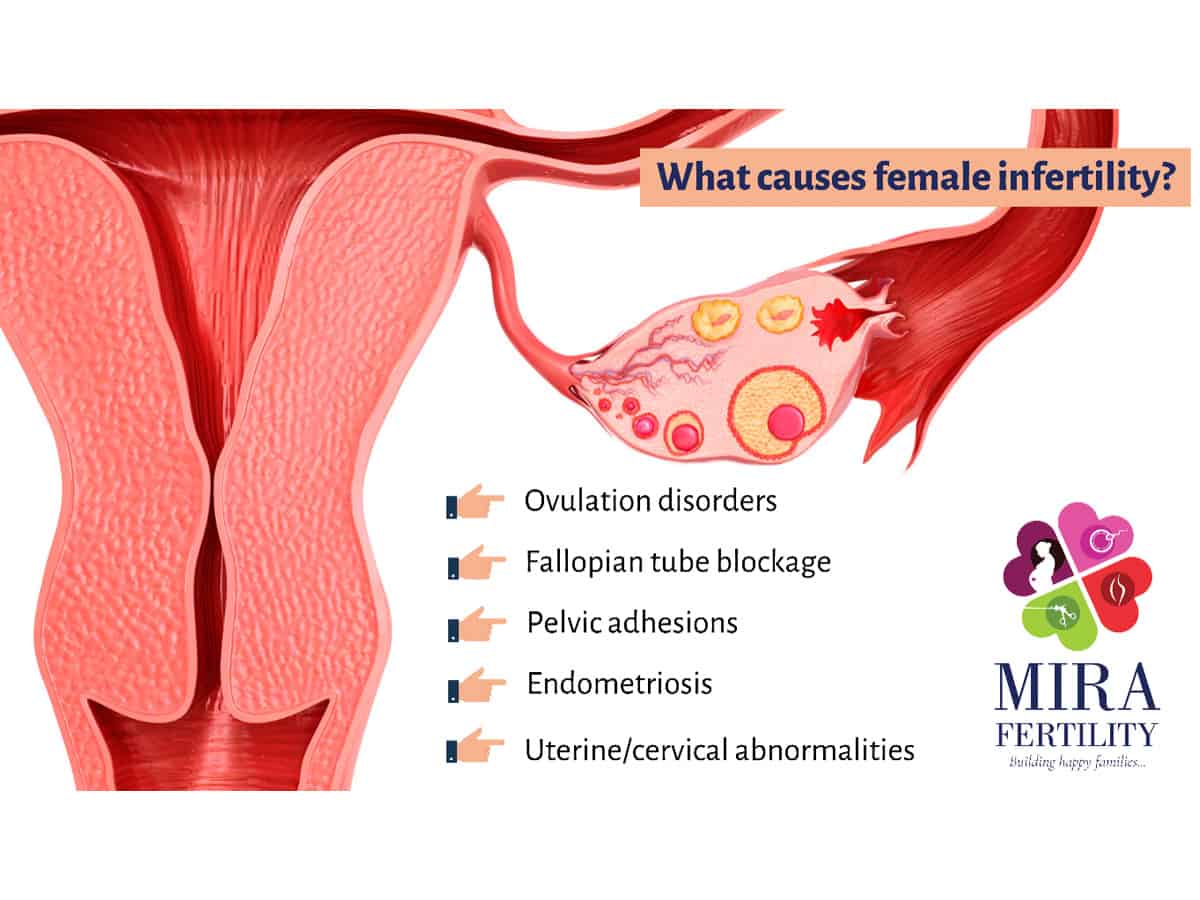
Infertility or sub-fertility is defined as the inability to get pregnant and give birth to a child even after 1 year of unprotected intercourse. About 10-15% of couples face challenges in conceiving and require some medical assistance. Of these couples, one-third have female causes for infertility, one-third have male causes, and one-third have combined male and female causes.
It is essential to understand the primary mechanism of fertility in women to understand the problems that lead to infertility.
Human reproduction is the synchrony of many complex endocrine steps that need to occur precisely for pregnancy to occur. The steps in this process are:
- One mature egg is released from one of the two ovaries each month
- The released mature egg gets picked up by the fallopian tube
- Sperms swim up the vagina, cervix, through the uterus, into the fallopian tube to reach the egg within the tube
- The egg is fertilized within the fallopian tube to form an embryo
- The embryo travels down the fallopian tube into the uterus
- The embryo attaches within the uterus to grow as a pregnancy
Thus, any problem in the uterus, fallopian tubes, ovaries, sperm, or hormones can lead to problems infertility. The 5 most common reasons for female infertility are:
1. Problems with egg production or release:
Problems in egg growth and release are the most common cause of infertility in women. They include:
- Polycystic ovarian syndrome (PCOS): PCOS is a hormonal imbalance that may lead to excess weight gain, improper egg growth, and release, acne, excess hair growth on the face and body. It is the most common cause of female infertility.
- Excess physical or emotional stress: Excess physical and emotional stress, excess weight loss, or weight gain can disrupt the hormonal rhythm of two essential hormones released from the brain – Follicle-stimulating hormone (FSH) and Luteinizing hormone (LH), which are required for proper egg growth and release.
- Excess prolactin hormone: Excess production of a hormone called prolactin (hyperprolactinemia) can impair proper egg growth.
- Primary ovarian insufficiency: Primary ovarian insufficiency is due to premature egg loss from the body before 35 years. It may be due to genetic factors, auto-immune reasons, chemotherapy, or unexplained reasons.
2. Problems with the womb/uterus or cervix:
Structural abnormalities within the uterus or cervix can interfere with egg implantation or predispose to miscarriage. They include:
- Benign growths like fibroids and polyps – Polyps and fibroids are usually non-cancerous (benign) growths of the uterus that can be seen in various locations, sizes, and numbers.
- Problems in the shape of the uterus could be from birth: uterine septum (wall within the uterus cavity) or bicornuate (two cavities) uterus. Many women with such problems still conceive, but this may lead to increased rates of miscarriage.
- Uterine adhesions can lead to sub-fertility – Uterine adhesions are caused by infections like tuberculosis or previous surgical procedures like dilatation and curettage.
3. Problems with the fallopian tubes:
Any factor that blocks the fallopian tubes or distorts them leads to tubal factor infertility. The most common cause for the tubal block is a pelvic inflammatory disease, either due to chlamydia, gonorrhoea, or tuberculosis.
Previous abdomen or pelvis surgery for tubal pregnancies can also lead to fertility problems.
4. Endometriosis:
Endometriosis reduces fertility in more than one way. Endometriosis is when the tissue that lines the inside of the uterus is present in other places like ovaries or tubes. This may impair egg development and egg quality and scar and block the tubes. Complete surgical removal and IVF may be required, depending on the severity of the disease.
5. Unexplained Infertility
In as many as 30% of the cases, the exact cause of infertility may not be identified. It may be due to a combination of many minor sub-cellular factors in both partners, leading to unexplained infertility. It is frustrating not to get an answer. Still, you should not delay the treatment as fertility is time- and age-dependent, especially in women.
Infertility can be incredibly stressful. If you have been trying for pregnancy for more than 12 months (1 year) without success, if you are over 35 years of age and been trying to get pregnant for more than six months, then consult us at Mira Fertility Center, Hyderabad, for proper evaluation and to develop a treatment plan to go forward.

DR. SUMINA REDDY
MS, DNB (OBG-GYN), FMAS, FRM, Advanced Diploma in Reproductive Medicine (UK & Germany)
Chief Fertility Specialist & Laparoscopic Surgeon
Mira Fertility Centre, Hyderabad
www.mirafertility.com | www.drsuminareddy.com
+91-9949991115 | info.mirafertility@gmail.com



